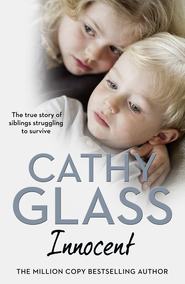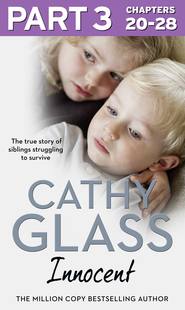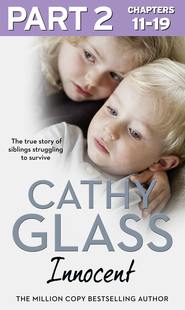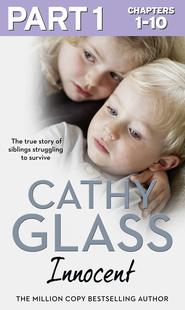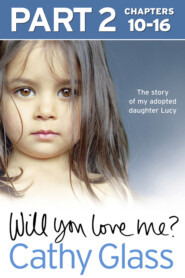По всем вопросам обращайтесь на: info@litportal.ru
(©) 2003-2024.
✖
Will You Love Me?: The story of my adopted daughter Lucy: Part 3 of 3
Настройки чтения
Размер шрифта
Высота строк
Поля
She held my gaze for a moment and then looked away. ‘I won’t be horrible while David is here.’
‘Good. He’s going to enjoy playing with you.’
For the next two weeks, while David was with us, Lucy’s behaviour did indeed improve. We didn’t have any angry outbursts, so I didn’t feel I was continually on a knife edge waiting for her to explode. Lucy became polite and cooperative and went out of her way to help me look after David. She’d always been nice to Adrian and Paula and my parents; it was me she’d directed her anger towards. Maybe Jill had been right when she’d said that Lucy had been receiving too much attention and that having David to stay would give us another focal point, or perhaps Lucy realized that there were other children in the world who’d had sadness in their lives as she had, but could still laugh. I didn’t know. But whatever the reason, I was grateful for the change in Lucy – the atmosphere in the house improved tremendously. I also noticed that her eating improved; not hugely, but since David had arrived she was more relaxed at the dinner table and was eating a little more.
Stevie paid us one of her scheduled visits during the second week that David was with us. It was 4.30 p.m. and Lucy was downstairs playing with David and Paula when Stevie arrived. Lucy blanked Stevie when she said hello, and then went up to her bedroom. I apologized to Stevie, but didn’t go up and try to persuade Lucy to come down; Stevie didn’t expect me to. Stevie stayed for half an hour, and while I updated her on Lucy Paula kept David amused. Among other things, Stevie asked what I was doing to meet Lucy’s cultural needs. I told her about the Thai meals we were cooking and that I talked to Lucy about Thailand whenever the opportunity arose.
‘Have you got her a Thai flag for her room?’ she asked.
‘No, but I will,’ I said, making a mental note to do so, as I’d previously forgotten.
I told Stevie that, while I still had concerns about Lucy’s eating, it had improved since David had been with us. Stevie made a note and said she was still trying to trace Lucy’s family – her parents and uncles. Stevie then said that, although she’d seen Lucy briefly, she still needed to have a quick look into her bedroom (it was a requirement of the social worker’s visit). So I took her up, knocked on Lucy’s bedroom door and opened it. Lucy still refused to speak to Stevie, but Stevie had seen enough to be able to include it in her report. As we returned downstairs, Toscha suddenly appeared from Lucy’s room. Stevie turned and shrieked.
‘I’m sorry,’ I said, rushing to pick up the cat, who was looking pretty scared. ‘I put her out earlier. I didn’t know she was up here.’
I heard Lucy laugh.
Later, after Stevie had gone, I reminded everyone that Toscha had to be kept out while Stevie was here, as she was allergic to cats.
Lucy grinned. ‘Toscha wanted to say hello to Stevie,’ she said.
Adrian exploded into laughter.
‘Well, please don’t do it again,’ I said. ‘You know Stevie’s got an allergy to cats.’
Of course Lucy knew, that’s why she’d done it – to cause Stevie discomfort.
After David had returned home, Lucy’s behaviour didn’t immediately deteriorate as I was half expecting it to: she’d been on her best behaviour for David’s sake, after all, and now there was no need to be any more. I wouldn’t say she was an angel, but the improvement in her behaviour continued, and she was also still eating a little more.
‘You’ll have to help us out with respite more often,’ Jill said, when I updated her.
I nodded. ‘Although not for a while,’ I said. ‘I need time to recover.’ I’m not always sure social workers appreciate just how tiring it is looking after children.
Spring gave way to summer and Lucy continued to make progress at home and school. When I saw her teacher, Miss Connor, for the end-of-term consultation, she said she was very pleased with Lucy’s academic improvement. She thanked me for all I was doing at home to help her, but said that Lucy was still struggling to make friends. She said she felt Lucy had erected a protective barrier around herself to stop others getting close. Lucy talked to other children, but didn’t form meaningful friendships as most children of her age did. Miss Connor had partnered Lucy with a new girl in the class to be her buddy: to show her around the school, be with her at lunchtime and generally help her settle in. Lucy had done what was required, but hadn’t developed the friendship as Miss Connor had hoped. When Miss Connor suggested to Lucy that she might like to be friends with the girl and take her home for tea, Lucy replied it wasn’t worth making friends, as she’d lose them when she moved in a year. This had upset Miss Connor, as it did me when I heard, although we both recognized the truth in what Lucy had said. When the court made its decision Lucy’s forever family would almost certainly live out of the area, which would mean a change of school.
‘I just hope the court hurries up, so Lucy can get on with the rest of her life,’ Miss Connor said.
But I knew from experience that the wheels of the law turn slowly.
By July, when Lucy had been with us for five months, I was feeling quietly confident that she was over the worst of her behaviour. She got annoyed and frustrated sometimes, but then so do most children. The only time Lucy really grew angry now was when there was any talk of her social worker or when she visited us, which she had to do. It wasn’t so much that Lucy didn’t like Stevie, more that she was anti social workers per se, because they had failed to protect her when she was younger. Telling Lucy it wasn’t Stevie’s fault didn’t help, and each time Stevie visited Toscha appeared. While I could see the humour in this, I was concerned by Lucy’s blatant disregard for Stevie’s welfare, so I told Lucy that if it happened again I’d stop her television.
‘Don’t care,’ Lucy said. ‘Do what you want.’
Later, she apologized to me for being rude.
Stevie telephoned me the day before the schools broke up for the summer holiday and very excitedly told me she’d managed to trace Lucy’s mother, Bonnie, and had set up contact for the following week. While I knew that Stevie had been looking for Lucy’s family, and that this was correct social-work practice, I wondered what effect this would have on Lucy, who’d come to terms with not seeing her mother. Also, if everything went to plan, Lucy would be with her permanent foster family in about eight months, and she would be expected to bond with them as her own family. I therefore wasn’t sure about the benefits of reintroducing her natural mother to her now.
‘I hope it doesn’t unsettle Lucy,’ I said.
‘Why should it?’ Stevie asked, quite sharply. ‘It’s the child’s mother, for goodness’ sake.’
‘It might give Lucy mixed messages,’ I said. ‘She might think there’s a chance of her returning home.’
‘I doubt it,’ Stevie said. ‘But if you’re worried, explain to her again what’s happening with the court and so on. She won’t see me, so I can’t.’ Stevie sounded extremely put out and I wondered if she’d expected me to congratulate her on tracing Lucy’s mother.
‘I will,’ I said. ‘Also, I’d like to take Lucy on holiday with us at the end of August. Do I have your permission?’
‘I should think so. Send me the details, and we’ll need Lucy’s mother’s permission as well, as she still has parental rights. You can mention it to her when you meet her at contact.’
‘Will do,’ I said.
When I told Lucy that Stevie had traced her mother and had set up contact, she shrugged as if she didn’t care.
‘It’s for an hour,’ I added. ‘At the contact centre. I’ll take and collect you. It will be nice for me to meet your mother.’
‘Will it?’ Lucy said blankly.
‘Yes,’ I said, trying to be positive. ‘And I’ll be able to talk to her about you coming on holiday with us. Reassure her that you’ll be safe by the sea.’ I’d already told Lucy I was hoping to take her on holiday.
‘She won’t care where I go,’ Lucy said, and changed the subject.
I thought that as Stevie was on a mission to trace Lucy’s family, and had already succeeded in tracing her mother, then she might succeed with Lucy’s other relatives, specifically her father. I talked to Lucy about this and the Thai culture and put renewed effort into acquiring a Thai flag, which wasn’t proving easy. I knew what the Thai flag looked like – it was horizontally striped in red, white and blue, but it wasn’t easy to find one to buy in England. I phoned various shops and department stores, and even our local Thai restaurant to see if they knew where I could buy one, but without any success. Then I went online, which is what I should have done to begin with. The Flag Store sold flags from all around the world, in various sizes and made from different materials. I could have bought a thirty-foot bunting, but I thought that was a bit over the top, especially as Lucy wasn’t even keen on the idea of having a flag. The smallest flag I could order was three feet by two feet. I put in my card details and the flag arrived three days later. I handed the parcel to Lucy and said, ‘I’ll help you hang it in your bedroom later.’
She shook out the flag and a look of disdain crossed her face. ‘I’m not having that in my bedroom!’ she said.
‘Perhaps I could trim it to make it smaller,’ I suggested.
‘No. I want to keep my posters.’ Lucy’s bedroom walls were covered with pictures of cuddly animals and cuttings from her favourite magazines.
‘You can keep those as well,’ I said. ‘The flag will only take up part of one wall, and it will make Stevie happy.’
‘No,’ Lucy said, her face setting.
‘We could pin it on your bedroom door?’ I suggested.
‘No,’ Lucy said.
‘What about on the outside of the door, so you can’t see it?’
‘No,’ Lucy said.
‘Or we could use it as a throw-over on your bed? Flags make popular bedspreads, especially with football supporters.’
Lucy glared at me and pushed the flag into my arms. ‘No, Cathy. I’m sorry, you’ve wasted your money. I don’t want it.’
Which I accepted. I put the flag away. At least I’d tried, and I could understand why a young girl would rather have pictures on her wall than a flag. There were other, more important issues to concentrate on, like preparing Lucy for seeing her mother, which I did over the coming week.
Chapter Eighteen
Другие электронные книги автора Cathy Glass
Innocent




 0
0






